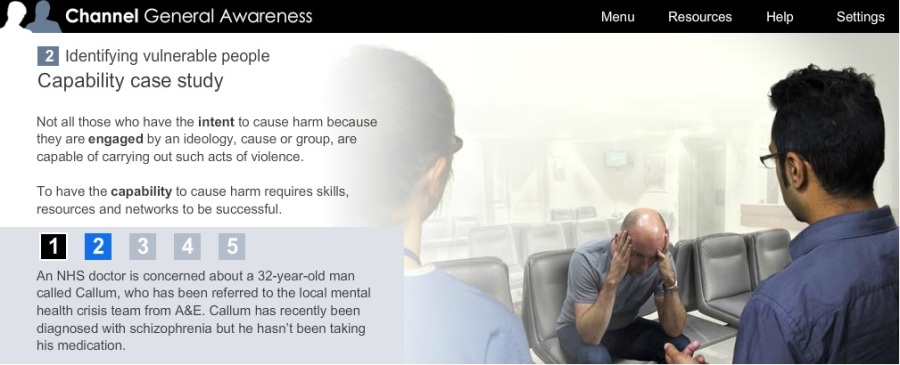Metropolitan Police Train For Disabled Terrorist Threat
Wednesday 06 April, 2016 Written by Chaminda Jayanetti
A bizarre online anti-terror training course from the College of Policing and the warns of the terror threat posed by someone who blames the British government and “the greed of the bankers” for losing his disability benefit.
The training module covers the Channel programme, part of the government’s controversial anti-extremism strategy called Prevent.
The course – called “Channel General Awareness” – has been created by the National Centre for Applied Learning Technologies, a joint initiative of the College of Policing and the Metropolitan Police that delivers online training.
“Vulnerable to radicalisation”
One of the aims of the course is to enable participants to “identify factors that can make people vulnerable to radicalisation”.

The course starts by noting: “There isn’t a single profile of someone who may be at risk of being drawn into terrorism”.
It goes on to say that frontline public service staff “can identify patterns of behaviour that show whether a person is engaged in an ideology, is intent on causing harm or capable of committing violent acts”.
It then shows a number of fictional case studies of people at risk of being drawn into terrorism, to help frontline staff in public services “identify all the factors relating to vulnerability to radicalisation”.
Blaming the government … for government benefit cuts
One of the fictional case studies is a 32-year-old man called Callum, who has recently been diagnosed with schizophrenia but hasn’t been taking his medication. He has been referred to the local mental health crisis team from A&E.

“Callum has been complaining of hearing voices and having visual hallucinations,” the course explains. “These intrusive thoughts are telling him to hurt people. He knows it’s wrong but he’s been taking his anger out on furniture and doors.
“Callum was discharged from the military 18 months ago. He was medically assessed for benefits which led to him no longer qualifying for Personal Independence Payment. He blames the British government and the greed of the bankers for their part in his financial downfall and believes they are the reason he is not getting help and support.”

The Personal Independence Payment (PIP) is a disability benefit for which the government recently tried to restrict eligibility. The success rate of applicants for PIP has fallen markedly in the last two years, as Sentinel News recently revealed.
The case study continues: “Callum has told the [mental health] crisis team that he has experience of working with nitrates and explosives in the Corps of Royal Engineers.
“When asked if he had ever thought of self-harm Callum stated that he had once attempted suicide but if he was going to do it he’d take half the establishment and the banks with him as well.”
Having set out Callum’s current state, the course attempts to show how he could represent a terror threat: “Callum’s extreme anti-establishment views mixed with mental health issues show that he has reasons for engagement and intent to involve himself in terrorism.
“It is however, his military background and knowledge of explosives that make him capable of carrying out his violent intentions.”
Staging an intervention
The course explains that frontline staff who have concerns about individuals should make referrals to the local police force’s Channel scheme.
The government says that Channel aims to identify and support people at risk of being drawn into terrorism. It does not itself involve criminal prosecutions, though critics fear it casts suspicion on innocent people for trivial statements. It is an early intervention programme, so children often come under its remit – a particular source of controversy.
The training course says that the support provided by Channel takes the form of various “interventions”, ranging from constructive activities to one-to-one mentoring and more comprehensive levels of support.
In the case study, Callum is given a support package involving referral to his community mental health team, signposting to a military veterans’ counselling charity, and meeting a Jobcentre advisor to arrange a place on a bricklaying course. This leads to a full-time job and a network of friends, and his therapy and clinical treatment mean he no longer has negative or suicidal thoughts.
It is not apparent why a referral to the Channel programme would be necessary in order for any of this support to be provided. There is no mention of his disability benefit being restored – PIP is paid to people in work as well as out of work.
While there is evidence of Islamic extremists preying on people with mental health issues, the course’s identification of an extreme left-wing terror threat is unsupported by evidence. There have been sporadic anarchist protests that have involved violence (mostly against property), but Britain has never had a far-left terrorist threat, unlike other countries in Western Europe.
It may be that “Callum” was included to ethnically balance out the other case studies, two of whom are Muslim – a young schoolboy and an Afghan asylum seeker. The final case study is a white female young offender who develops links with Combat 18, a violent neo-Nazi group that in reality is virtually defunct in the UK.
The Channel General Awareness course was launched in late 2014. The extent of its usage is not clear, although it appears to form part of ongoing training for social workers and other council staff, NHS staff and education workers in different areas.
Leave a comment
Make sure you enter all the required information, indicated by an asterisk (*). HTML code is not allowed.
Join
FREE
Here










